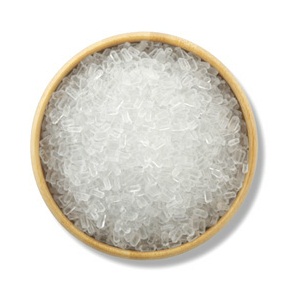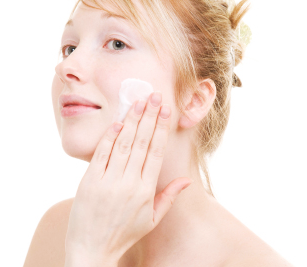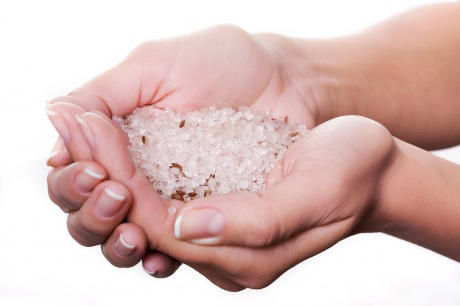Popular Articles
- 35 Herbal Treatments for Acne
- 10 Vitamins for Acne
- When Does Acne Stop for Men, Women, & Teens?
- Tea and Acne - 4 Teas that Help
- 6 Supplements for Acne
- Acne Nodules - Get Rid of Them
- Peroxide for Acne - Hydrogen & Benzoyl Peroxide
- Natural Alternatives for Accutane
- Actimine Supplement Facts
- Vitamin C and Acne - Effective?
- More Articles ...
 Epsom Salt for AcneIn This Article
Epsom salt is a popular natural remedy for both traditional facial acne and body acne. Epsom salt may be used in many different ways to fight acne breakouts.
Salt is one of the more popular types of natural acne treatments. One of the reasons that salt is so highly regarded is that it is essentially free. It can be purchased at any grocery store, mixed with water, and used to create what many believe to be a powerful acne cleanser. Of all natural salt acne cures available, Epsom salt may be the most popular. What is Epsom Salt?
It is this magnesium that many believe gives Epsom salt its medicinal qualities, particularly with regard to Epsom salt for acne and general skin care. Modern-day human beings have considerably less magnesium in their diets than human beings of the past, due primarily to changing agricultural and food preferences. Yet magnesium has a considerable effect on the health of the body, as it plays a role in the creation of numerous enzymes that promote better health. Numerous experts now promote the idea of integrating magnesium into modern-day lifestyles to make up for this deficiency – most of which involve some use of Epsom salt. Acne and Epsom SaltRecently one of the most popular ideas that experts have promoted is Epsom salt for acne. The idea is to make a mixture of Epsom salt and water or some other type of solution, and allow it to seep into your skin. Currently, there is little to no research on the effectiveness of Epsom salt on acne. Normally that would discourage regular use of this mixture. However, anecdotally the benefits of Epsom salt are held in very high regard. On most acne forums, those that have used Epsom salt for acne state that Epsom salt has been one of the most effective natural solutions for clearing up much of their skin. In addition, unlike other natural acne solutions, Epsom salt's benefits are less likely to be fueled by an aggressive marketing campaign. Epsom salt is available in everyday grocery stores, indicating that Epsom salt may truly be one of the more under-researched secrets in reducing the appearance of acne. How Does Epsom Salt for Acne Work?Because research into Epsom salt is lacking, it's not clear what makes Epsom salt a valuable natural solution for treating acne. Some theories include:
Because of the lack of research into both magnesium sulfate and Epsom salt specifically, it is difficult to know exactly what the link is between acne and Epsom salt if there is a link at all. Yet the sheer number of individuals that have noted clearer skin after taking Epsom salt is not to be ignored, so it is possible that Epsom salt directly benefits skin and acne health. How is Epsom Salt Used?
Facial acne is perhaps the most common reason that men and women try Epsom salt for acne. But because Epsom salt is safe and easily accessible it's a popular addition to warm baths, Epsom salt is also used for acne on other areas of the body as well, including:
There are several methods of using Epsom salt that may be beneficial for attacking body acne or relieving facial acne, or both. Some of the most common ways that people use Epsom salts include:
Some manufacturers have also created their own cleansers that utilize Epsom salts. However, according to most Epsom users, it's easily possible to create a solution on your own and receive similar benefits. Side Effects of Epsom Salt for AcneEpsom salt is not a drug, so side effects are relatively rare. However, Epsom salt does have some precautions that require you to strongly consider whether or not you want to take Epsom salt for acne. First, Epsom salt is still a salt. If it comes into contact with an open wound, it can be very painful. Epsom salt on its own is also a very abrasive agent. It should always be mixed well with water, a cleanser, or whatever else you choose to do with your Epsom salt in order to reduce the risk of aggravating your skin. Using Epsom salt improperly by rubbing it directly on the skin may actually increase acne production. Epsom salt designed for topical/skin use should not be ingested. There are other types of Epsom salt designed for ingestion, and those need to be used as directed. Epsom salt may also interact with several drugs (although this usually occurs when you take Epsom salt as a supplement rather than external salt), so always contact your doctor first if you are taking any medications that may interact with magnesium sulfate or magnesium. Acne and Epsom Salt – Does it Really Work?There is so little research into acne and Epsom salt or ache and magnesium sulfate that whether or not there are benefits remains unclear.
Magnesium sulfate may reduce inflammation, remove dead skin, and dry the skin. These are supported by what research has shown with salts and magnesium. Yet it's unclear whether or not this is enough to truly reduce acne. Also, all skin is different, so it is possible that this effect may work for some and not for others. It's unlikely that purging toxins is enough to cure acne either. Acne is caused by bacteria, and while food may fuel acne breakouts, there is currently little research into the link between toxins and acne breakouts. In addition, while it's possible that Epsom salt kills bacteria that causes acne, it would also kill good bacteria – bacteria that may keep your skin healthy and protected. No salt can tell the difference between a good or bad bacteria, and it's possible that those that use Epsom salt find that their skin and/or acne is worse as a result of this bacterial death. Some have posited that the most likely reason that those using Epsom salt claim to see a significant benefit is that they are changing their cleansing routines as a result of their Epsom salt for acne use. For example, those that put Epsom salt in their bath may be spending longer in the bath in order to get the "full effect" of the salt. These people may be attributing the act of spending longer in the bath erroneously to the effect of Epsom salts. Similarly, those that place Epsom salt in a cleansing mixture may be more careful about ensuring their entire face is covered in the cleanser, then giving credit to Epsom salt incorrectly when the cleanser itself is actually providing the acne-fighting benefits. Despite the lack of evidence, those that use Epsom salt are adamant that the mixtures are clearing their skin. It's possible that the benefits of Epsom salt on the skin are not yet known, or that one of the theories listed above is correct. Without research into the efficacy of Epsom salt compared to other skin treatment methods, it is difficult to know if Epsom salt has any effect compared to other types of cleansers or treatment options. Generally, when a treatment isn't supported by research it is safer to assume that it is ineffective at treating acne. But in the case of Epsom salt, because it is so readily accessible and generally free of side effects, there is no harm in using Epsom salt for a short period of time and seeing if it has any effect on your acne. All skin is different, and it is possible that Epsom salt is effective for clearing acne in some types of skin. Sourceshttp://www.umm.edu/altmed/articles/magnesium-000313.htm http://www.ncbi.nlm.nih.gov/pubmed/18030818 http://www.epsomsaltcouncil.org/articles/report_on_absorption_of_magnesium_sulfate.pdf |
|||||||||||
| Next Article: Aloe for Acne Treatment |





 Epsom salt is not a traditional salt like sea salt or table salt. While traditional salt is made with
Epsom salt is not a traditional salt like sea salt or table salt. While traditional salt is made with  One of the other reasons that Epsom salt is such a popular treatment is that it can be used for any type of acne.
One of the other reasons that Epsom salt is such a popular treatment is that it can be used for any type of acne. Experts argue that many of the perceived benefits of Epsom salt for acne are unlikely.
Experts argue that many of the perceived benefits of Epsom salt for acne are unlikely.